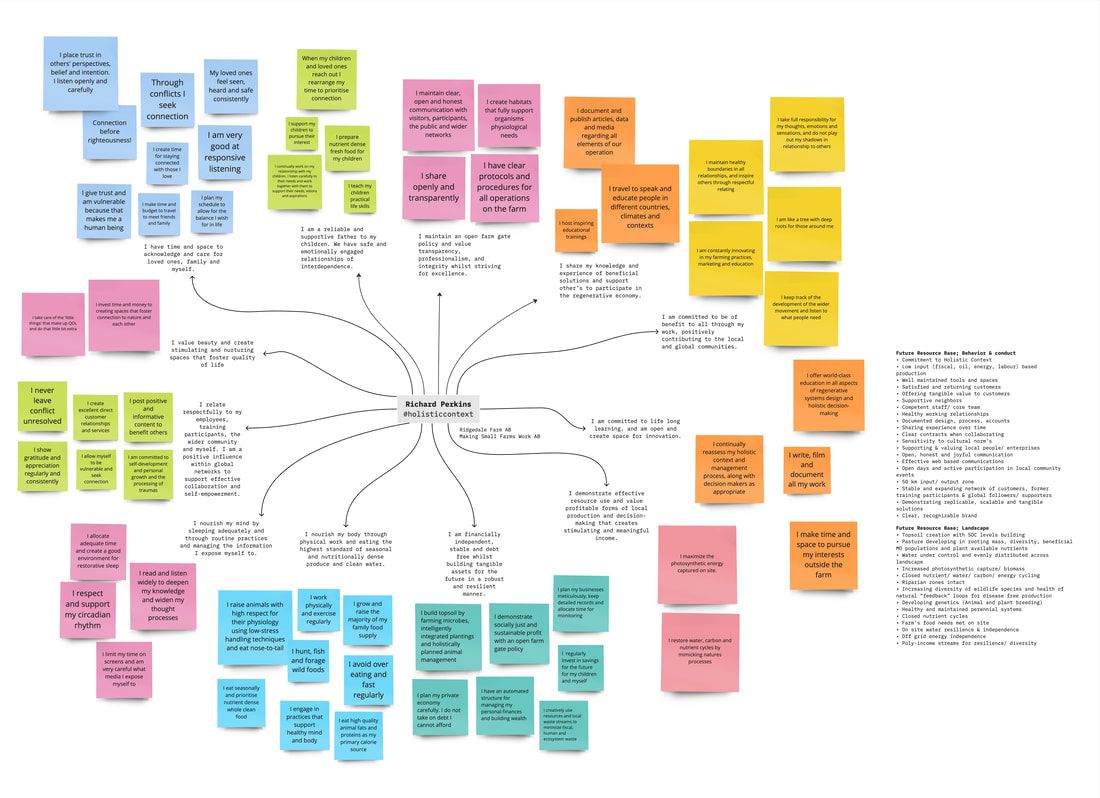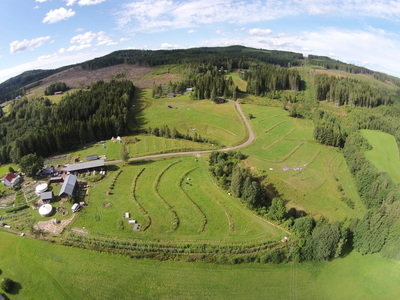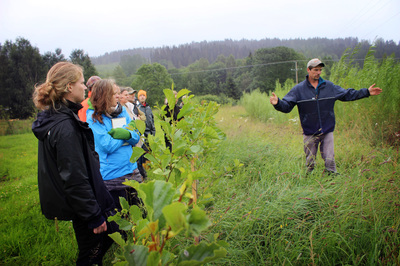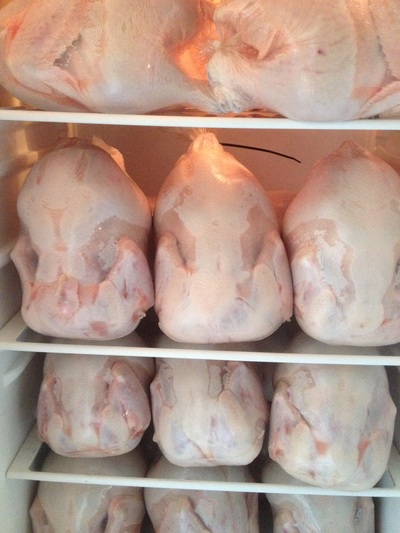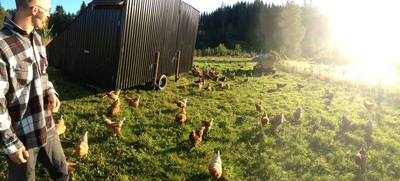Today many people around the world are promoting sustainability, good animal management and organic production. It's worth considering that this is all humans did until very recently, and yet history shows us that civilisation after civilisation has failed. The current state of global resource mis- management needs little introduction. The strategies and techniques we use to regenerate landscapes whilst meeting our needs socially & economically are important, but management & decision making is key to long term success. Humans have never had a clear way to deal with complex systems and in agriculture, by default, we are working with ecological, economic and social complexities. Whilst we usually meet our simple objectives in everyday life successfully, on the longer term & society wide our species constantly meets unintended consequences of this decision making. This is because our day to day decision making is mostly around immediate problems, needs and desires which often lack a defined holistic context. Managing holistically begins by defining how we wish our life to be in the context of these complex systems, and we consider the resource bases under our management to ensure our decision making leaves intact (or improves) these resources for generations to come. Only once our holistic context is defined can we manage effectively, consistently and holistically in alignment with these.
|
Holistic Management was first developed over 40 years ago by Allan Savory, a Zimbabwean biologist, game ranger, politician, farmer, and rancher, who was searching for ways to save the beautiful savannah and its wildlife in southern Africa. Managing holistically relates to all human activities, not just livestock production, although this is usually people's first exposure to it. The 20 min. video above documents Allan Savory's work in a nutshell, and is well worth your time if you have not come across it before.
Managing livestock holistically is based on four key insights that highlight the symbiotic relationship between large herds of grazing animals, their predators and the grasslands that support them:
|
Kirk Gadzia, 10 Principles of Holistic Management
(Relating specifically to holistic planned grazing & livestock)
|
managing holistically at ridgedale FARM
Whole Under Management
People/Decision Makers
Richard Perkins is the owner and the primary decision maker at Ridgedale Farm. Employees have decision-making power within their roles/ responsibilities within the context of their roles. Intern’s have creative decision making in aspects of their experience and are included in decision making where appropriate. This does not include longer-term design modification or financial planning.
Statement of purpose
Ridgedale Farm's primary responsibility is regenerating the landscape and ecosystem processes through replicable, scalable and profitable farm enterprises. The secondary responsibility is to educate, inform and empower other people to do the same for themselves.
People/Decision Makers
Richard Perkins is the owner and the primary decision maker at Ridgedale Farm. Employees have decision-making power within their roles/ responsibilities within the context of their roles. Intern’s have creative decision making in aspects of their experience and are included in decision making where appropriate. This does not include longer-term design modification or financial planning.
Statement of purpose
Ridgedale Farm's primary responsibility is regenerating the landscape and ecosystem processes through replicable, scalable and profitable farm enterprises. The secondary responsibility is to educate, inform and empower other people to do the same for themselves.
|
Quality of life;
Richard believes that financially sustainable and socially beneficial livelihoods are founded on regenerating the world’s biospheres. These three aspects that make up our triple bottom line are totally inseparable and so our decision-making consistently reflects this. • I maintain an open farm gate policy and value transparency, professionalism, and integrity whilst striving for excellence. • I share my knowledge and experience of beneficial solutions and support other’s to participate in the regenerative economy. • I am committed to be of benefit to all through my work, positively contributing to the local and global communities. • I am committed to life long learning, and am open and create space for innovation. • I demonstrate effective resource use and value profitable forms of local production and decision-making that creates stimulating and meaningful income. • I am financially independent, stable and debt free whilst building tangible assets for the future in a robust and resilient manner. • I nourish my body through physical work and eating the highest standard of seasonal and nutritionally dense produce and clean water. • I nourish my mind by sleeping adequately and through routine practices and managing the information I expose myself to. • I relate respectfully to my employees, training participants, the wider community and myself. I am a positive influence within global networks to support effective collaboration and self-empowerment. • I value beauty and create stimulating and nurturing spaces that foster quality of life Forms of production; • I maintain clear, open and honest communication with visitors, participants, the public and wider networks • I create habitats that fully support organisms physiological needs • I share openly and transparently • I have clear protocols and procedures for all operations on the farm • I document and publish articles, data and media regarding all elements of our operation • I travel to speak and educate people in different countries, climates and contexts • I host inspiring educational trainings • I am constantly innovating in my farming practices, marketing and education • I keep track of the development of the wider movement and listen to what people need • I offer world-class education in all aspects of regenerative systems design and holistic decision-making • I continually reassess my holistic context and management process, along with decision makers as appropriate • I write, film and document all my work • I place trust in others' perspectives, belief and intention. I listen openly and carefully • Through conflicts I seek connection • Connection before righteousness! • I take full responsibility for my thoughts, emotions and sensations, and do not play out my shadows in relationship to others • I maintain healthy boundaries in all relationships, and inspire others through respectful relating • I am a reliable and supportive father to my children. We have safe and emotionally engaged relationships of interdependence • When my children and loved ones reach out I rearrange my time to prioritise connection |
Forms of production continued;
• I make time and space to pursue my interests outside the farm • I maximize the photosynthetic energy captured on site. • I restore water, carbon and nutrient cycles by mimicking natures processes • I build topsoil by farming microbes, intelligently integrated plantings and holistically planned animal management • I demonstrate socially just and sustainable profit with an open farm gate policy • I plan my businesses meticulously, keep detailed records and allocate time for monitoring • I plan my private economy carefully. I do not take on debt I cannot afford • I have an automated structure for managing my personal finances and building wealth • I regularly invest in savings for the future for my children and myself • I creatively use resources and local waste streams to minimize fiscal, human and ecosystem waste • I raise animals with high respect for their physiology using low-stress handling techniques and eat nose-to-tail • I work physically and exercise regularly • I grow and raise the majority of my family food supply • I hunt, fish and forage wild foods • I avoid over eating and fast regularly • I engage in practices that support healthy mind and body • I eat high quality animal fats and proteins as my primary calorie source • I allocate adequate time and create a good environment for restorative sleep • I respect and support my circadian rhythm • I read and listen widely to deepen my knowledge and widen my thought processes • I limit my time on screens and am very careful what media I expose myself to • I create excellent direct customer relationships and services • I post positive and informative content to benefit others • I allow myself to be vulnerable and seek connection • I am committed to self-development and personal growth and the processing of traumas • I take care of the 'little things' that make up QOL and do that little bit extra • I invest time and money to creating spaces that foster connection to nature and each other • I create time for staying connected with those I love • I make time and budget to travel to meet friends and family • I plan my schedule to allow for the balance I wish for in life • I support my children to pursue their interest • I continually work on my relationship with my children. I listen carefully to their needs and work together with them to support their needs, visions and aspirations • I prepare nutrient dense fresh food for my children • I teach my children practical life skills • My loved ones feel seen, heard and safe consistently • I am very good at responsive listening • I give trust and am vulnerable because that makes me a human being • I am like a tree with deep roots for those around me • I never leave conflict unresolved • I show gratitude and appreciation regularly and consistently |
|
Future resource base;
Behavior & conduct • Commitment to Holistic Context • Low input (fiscal, oil, energy, labour) based production • Well maintained tools and spaces • Satisfied and returning customers • Offering tangible value to customers • Supportive neighbors • Competent staff/ core team • Healthy working relationships • Documented design, process, accounts • Sharing experience over time • Clear contracts when collaborating • Sensitivity to cultural norm’s • Supporting & valuing local people/ enterprises • Open, honest and joyful communication • Effective web based communications • Open days and active participation in local community events • 50 km input/ output zone • Stable and expanding network of customers, former training participants & global followers/ supporters • Demonstrating replicable, scalable and tangible solutions • Clear, recognizable brand |
Future Landscape • Topsoil creation with SOC levels building • Pasture developing in rooting mass, diversity, beneficial MO populations and plant available nutrients • Water under control and evenly distributed across landscape • Increased photosynthetic capture/ biomass • Closed nutrient/ water/ carbon/ energy cycling • Riparian zones intact • Increasing diversity of wildlife species and health of natural “feedback” loops for disease free production • Developing genetics (Animal and plant breeding) • Healthy and maintained perennial systems • Closed nutrient cycles • Farm’s food needs met on site • On site water resilience & independence • Off grid energy independence • Poly-income streams for resilience/ diversity |
Testing questions;
To manage holistically we use these testing questions to help systematically consider the social, financial, and environmental aspects of decisions we need to make. It allows us to consider the wider perspective of our Holistic Goal consistently and effectively.
1. Cause and effect: Does this action address the root cause of the problem, or merely a symptom?
2. Marginal reaction: Is there another action that could provide greater return, in terms of your holistic goal, for the time and money spent?
3. Sustainability: If you take this action, will it lead toward or away from the future resource base described in your holistic goal? (Social/ Land)
4. Weak link:
o Social: If you take this action, will you encounter or create a blockage to progress?
o Biological: Does this action address the weakest point in the life cycle of the organism you're trying to control or promote?
o Financial: Does this action strengthen the weakest link in the chain of production?
5. Energy/money source & use
o Is the energy or money to be used in this action derived from the most appropriate source in terms of your holistic goal?
o Will the way in which energy or money is to be used lead toward your holistic goal?
6. Gross profit analysis: Which enterprise contributes more to covering the overheads of the business? (Use this test when comparing two or more enterprises.)
7. Society & culture:
1. How do you feel about this action now?
2. Will it lead to the quality of life you desire?
3. Will it adversely affect the lives of others?
To manage holistically we use these testing questions to help systematically consider the social, financial, and environmental aspects of decisions we need to make. It allows us to consider the wider perspective of our Holistic Goal consistently and effectively.
1. Cause and effect: Does this action address the root cause of the problem, or merely a symptom?
2. Marginal reaction: Is there another action that could provide greater return, in terms of your holistic goal, for the time and money spent?
3. Sustainability: If you take this action, will it lead toward or away from the future resource base described in your holistic goal? (Social/ Land)
4. Weak link:
o Social: If you take this action, will you encounter or create a blockage to progress?
o Biological: Does this action address the weakest point in the life cycle of the organism you're trying to control or promote?
o Financial: Does this action strengthen the weakest link in the chain of production?
5. Energy/money source & use
o Is the energy or money to be used in this action derived from the most appropriate source in terms of your holistic goal?
o Will the way in which energy or money is to be used lead toward your holistic goal?
6. Gross profit analysis: Which enterprise contributes more to covering the overheads of the business? (Use this test when comparing two or more enterprises.)
7. Society & culture:
1. How do you feel about this action now?
2. Will it lead to the quality of life you desire?
3. Will it adversely affect the lives of others?
